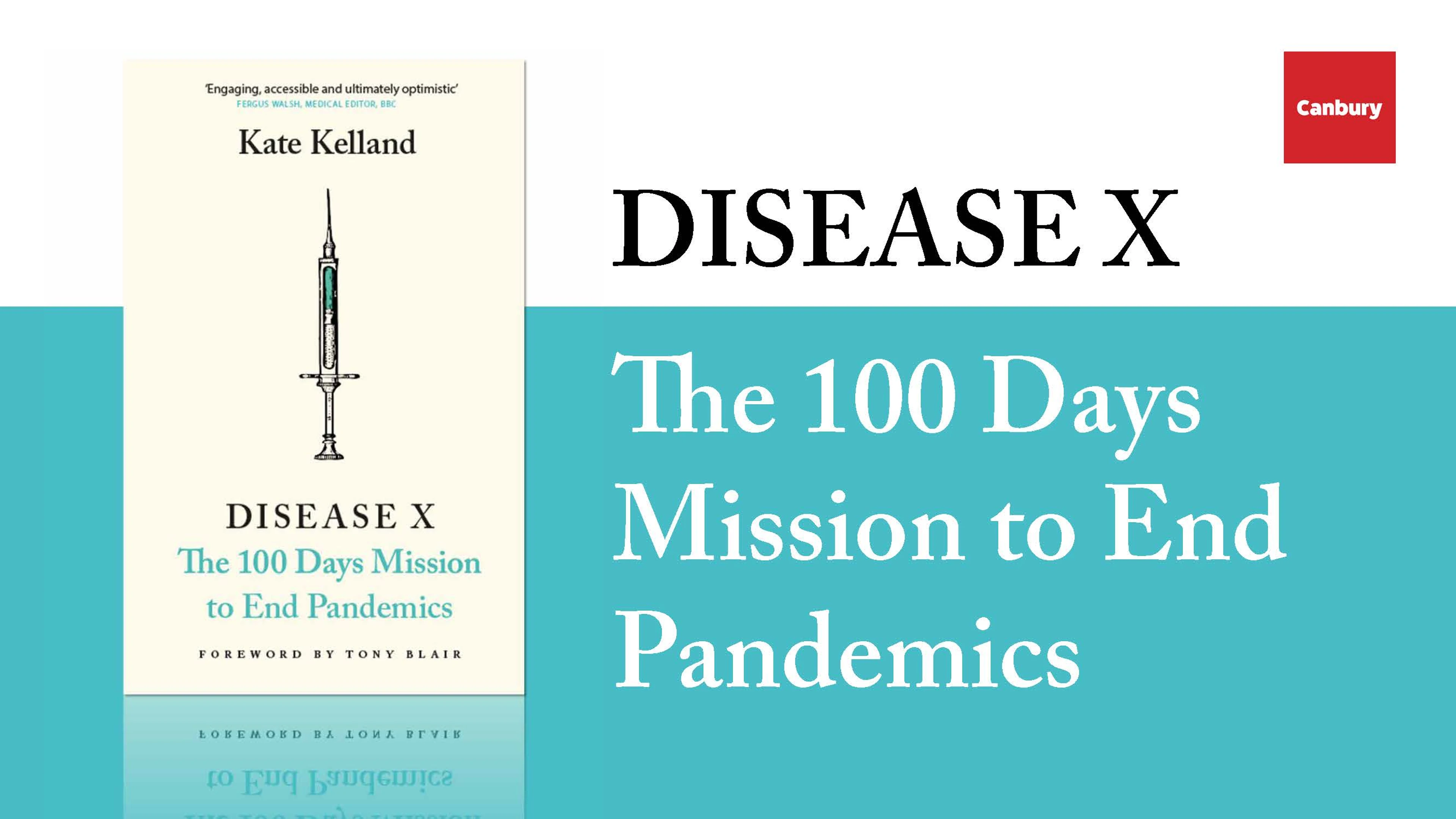OUT NOW: DISEASE X — The 100 Days Mission to End Pandemics, by Kate Kelland
A must-read inside track on how the world can stop future pandemics
Kelland offers a unique perspective on the COVID-19 response and lays out a roadmap to prepare to beat the next Disease X
DISEASE X challenges us to understand continual and growing infectious disease threats, but also offers hope and looks ahead to a pandemic-free future
Jan 27, 2023; Oslo, Norway: An important new book on pandemic control, DISEASE X — The 100 Days Mission to End Pandemics, will be published in the UK on 2nd February. This compelling narrative by Kate Kelland, Chief Scientific Writer at the Coalition for Epidemic Preparedness Innovations (CEPI), draws on her unique access to key players and their experiences at the frontlines of pandemic planning and response and takes the reader inside global efforts to prevent future outbreaks from exploding into deadly crises.
Distilling insights from health security experts, examining epidemics and pandemics of the past and present, and analysing what governments, societies and their people got right and wrong in the response to COVID-19 and other devastating disease outbreaks, Kelland explores why and how viruses—tiny as they are—can wreak enormous havoc on our way of life. But she also tells a story of hope, giving readers a glimpse of a future where the threat of pandemics has been neutralised by a prepared and collaborative world.
"As the threat of COVID subsides from public consciousness, there is a risk too that our memories of the terrible impacts of pandemics will also begin to fade," said Dr Richard Hatchett, CEO of CEPI. "But what we don't want to do is take our eye off the ball. This book, DISEASE X, with its accessible storytelling and discussion of the decision-making challenges that leaders face when confronted with a new infectious disease, will help us not to forget, but instead to strive towards a post-pandemic era where we work together to stop something like COVID-19 from ever happening again."
Kelland, who was formerly a global health and science correspondent for Reuters, said: "The book's unique perspective, from both outside and inside some of the biggest pandemic prevention minds, will, I hope, give it a useful role in deepening understanding of how, as we emerge from COVID-19, it doesn't have to be this way when we face the next ‘Disease X'."
DISEASE X: PREPARE to be Scared
Disease X is the codename given by the World Health Organization to a pathogen currently unknown to science that could cause havoc to humankind.
Emerging infections are sending us multiple warnings that another Disease X is looming. We've had SARS in 2002, H5N1 bird flu in 2004, H1N1 ‘swine flu' in 2009, MERS in 2012, Ebola in 2014, Zika in 2015 and now COVID-19. These events are not freak events, but are happening continually, and at an increasing cadence.
"Given that we know there are so many other viral disease Xs out there, that we know the extreme danger they pose, and that we now know—in part thanks to the dramatic scientific advances made during the Covid crisis—how we can contain and halt epidemics before they spiral out of control, there is truly no excuse to be unprepared again", Kelland said.
As people around the world emerge from the COVID-19 crisis with an understandable desire to put pandemics to the back of their mind, Kelland counsels against complacency and advocates instead for preparedness: PREPARE to be Scared, PREPARE to Move Fast, PREPARE to Share, PREPARE to Fail, she urges in DISEASE X. These features of speed, bravery, collaboration, agility and humility are factors Kelland identifies as crucial to tackling and containing future disease epidemics before they can wreck billions of lives and livelihoods, as COVID-19 has done.
Writing in the foreword of DISEASE X, Sir Tony Blair, former UK Prime Minister and Executive Chairman of The Institute for Global Change, cautions that: "The past few years have made it abundantly clear that we are living in an increasingly interconnected world where invisible viral threats are emerging more often, leaving us all more vulnerable. "Health security will never be achieved if we do not build the lessons of Covid- 19 into the way our governments and societies operate. Our governments need to demonstrate the same level of political will, ambition and international cooperation that leaders demonstrated in the wake of World War II."
DISEASE X has already won plaudits from expert commentators on science and global health.
Fergus Walsh, the BBC's Medical Editor, describes DISEASE X as "an engaging, accessible and ultimately optimistic account of how nations, institutions and the scientific community responded to COVID, and how they could work together in future".
Anjana Ahuja, an author and Financial Times contributing writer on science, said: "As Kelland argues cogently, fear of the next outbreak should not paralyse us but instead galvanise us into making sure the terrible toll of COVID-19 is not repeated. DISEASE X is a valuable policy roadmap in a world custom-built for pandemics."
"Three years after the COVID crisis erupted, we're desperate to move on. But this important book outlines why it will be vital to keep pandemic threats at the top of our priority list for decades to come," said James Paton, former health correspondent at Bloomberg.
DISEASE X — The 100 Days Mission to End Pandemics, is published by Canbury Press on February 2nd, 2023. PRE-ORDER today via bookshop.org. All author proceeds will be donated to the WHO Foundation COVID-19 response.
—ENDS—
Note to editors
About the author and the writing of DISEASE X
Kate Kelland joined CEPI as Chief Scientific Writer in August 2021 after almost three decades as a Reuters journalist. At that time, two years into the COVID pandemic, and as CEPI marked its five-year anniversary, Kate embarked on a project to create a narrative of CEPI's crucial role in the global response to the emergence of SARS-CoV-2, and of its ongoing vital mission to help the world bolster health security and be ready extinguish or minimise the threat of future pandemics.
Kate was an international correspondent at Reuters for 27 years, winning multiple awards during the 12 of those years she spent covering global health. She covered the 2009 H1N1 ‘swine flu' pandemic, led international coverage of the emergence in 2012 of the coronavirus that causes MERS, tracked the vast Ebola epidemic of 2014 to 2016 and the eventual development of vaccines against it, and was at the heart of global reporting of the COVID-19 pandemic. She won the 2017 London Foreign Press Association Science Story of the Year award for her investigative reporting; in 2016, she won the Medical Journalists Association's Feature of the Year award; she was joint overall winner of the European Health Prize for Journalists in 2011 and UK winner of the same prize in 2011, 2012, and 2013.
About CEPI
CEPI is an innovative partnership between public, private, philanthropic, and civil organisations, launched in 2017, to develop vaccines against future epidemics. Its mission is to accelerate the development of vaccines and other biologic countermeasures against epidemic and pandemic threats so they can be accessible to all people in need.
Prior to COVID-19, CEPI's work focused on developing vaccines against Ebola virus, Lassa virus, Middle East Respiratory Syndrome coronavirus, Nipah virus, Rift Valley Fever virus and Chikungunya virus — it has over 20 vaccine candidates against these pathogens in development. CEPI has also invested in new platform technologies for rapid vaccine development against unknown pathogens (Disease X).
CEPI has played a central role in the global response to COVID-19, supporting the development of the world's largest portfolio of vaccines against SARS-CoV-2 and its variants with a focus on speed, scale and access, as well as co-leading COVAX, the global initiative to deliver fair and equitable access to COVID-19 vaccines. CEPI is also the world's leading funder of R&D for broadly protective coronavirus vaccines which could protect against future variants of COVID-19 as well as other coronaviruses with epidemic and pandemic potential.
CEPI has embarked upon an ambitious US$3.5bn five-year plan — called CEPI 2.0 — to dramatically reduce or even eliminate the future risk of pandemics and epidemics. Central to the plan is CEPI's goal — supported by the G7 and G20 — to compress the time taken to develop safe, effective, globally accessible vaccines against new threats to just 100 days. Achieving this ‘100 Days Mission' would give the world a fighting chance of containing a future outbreak before it spreads to become a global pandemic. Read the plan at endpandemics.cepi.net/
Follow our news page for the latest updates. Follow us @CEPIvaccines, @DrRHatchett, and LinkedIn.
Media Contacts
Email: [email protected]
Tel: +44 7387 055214
For a review copy of DISEASE X, please contact:
Gaby Monteiro
Marketing and Social Media Officer, Canbury Press
[email protected]


.webp)
